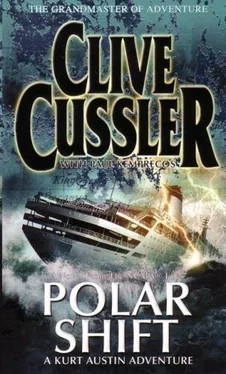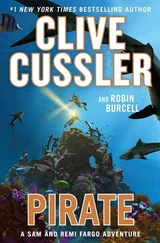Some of the water drained out through the windows, and the captain fought his way back to the controls. All the control screens were dead. The ship had lost its radar, gyro compasses and radio communication, but, most seriously, its power. All the instrumentation had become short-circuited. The steering gear was useless.
The captain went to a window and surveyed the physical damage. The bow had been destroyed, and the ship was listing. He suspected that the hull plating may have been penetrated. The lifeboats on the foredeck had been swept from their davits. The ship wallowed like a drunken hippopotamus.
The big wave seemed to have stirred up the seas around it like a demagogue rousing a mob. Waves rolled across the foredeck. Worse, with its engines having failed, the ship was lying transversely to the seas, drifting in the worst possible position.
Having survived the wave, the ship lay with its side exposed, in danger of being "holed," in the colorful jargon of the sea.
The captain tried to remain optimistic. The Southern Belle could survive even with some compartments flooded. Someone would have heard the SOS. The ship could float for days, if necessary, until help arrived.
"Captain." The first officer interrupted the captain's thoughts.
Butler was staring through the broken window. His eyes were locked in an unbelieving stare on a distant point. The captain's gaze followed Butler's pointing finger, and he began to tremble as the thrill of fear went through him.
Another horizontal line of foam was forming less than a quarter of a mile away.
The first airplane arrived two hours later. It circled over the sea and was soon joined by other planes. Then the rescue ships began to arrive, diverted from the shipping routes. The ships lined up three miles apart and combed the sea like a search party looking for a lost child in the woods. After days of searching, they found nothing.
The Southern Belle, one of the most advanced cargo ships ever designed and built, had simply vanished without a trace.
Seattle, Washington
The arrow-slim kayak flew across the sapphire surface of Puget Sound as if it had been shot from a bow. The broad-shouldered man in the snug cockpit seemed at one with the wooden craft. He dipped his paddles in the water with an easy, fluid motion, concentrating the power of his brawny arms into precise strokes that kept the kayak moving at a steady speed.
Sweat glistened on the kayaker's rugged, sun-burnished features. His piercing, light blue eyes, the color of coral under water, took in the broad expanse of the sound, the fog-shrouded San Juan Islands and, in the distance, the snowcapped Olympic Mountains. Kurt Austin gulped the salty air into his lungs and spread his lips in a wide grin. It felt good to be home.
Austin's duties as the director of the Special Assignments Team for the National Underwater and Marine Agency constantly took him to far-flung parts of the world. But he had acquired his taste for the sea on the waters around Seattle, where he was born. Puget Sound was as familiar to him as an old flame. He had sailed boats on the sound almost from the day he could walk, and had raced boats since he was ten. His big love was racing boats; he owned four of them: an eight-ton catamaran, capable of speeds of more than a hundred miles an hour; a smaller, outboard hydroplane; a twenty-foot sailboat; and a scull that he liked to row early in the morning on the Potomac.
The latest addition to his fleet was the custom-made Guillemot kayak. He had bought it on an earlier trip to Seattle. He liked its natural wood construction and the graceful design of the thin hull, which was based on an Aleut craft. Like all his boats, it was fast as well as beautiful.
Austin was so intent absorbing the familiar sights and smells that he almost forgot that he was not alone. He glanced over his shoulder. A flotilla of fifty kayaks trailed a few hundred feet behind his ribbonlike wake. The heavy, fiberglass, double-cockpit kayaks each carried one parent and one child. They were safe and stable, and no match for Austin's racehorse. He removed a turquoise NUMA baseball cap, revealing a jungle of prematurely gray, almost platinum hair, and waved it high above his head to urge them on.
Austin had not hesitated when his father, the wealthy owner of an international marine salvage company based in Seattle, had asked him to lead the annual benefit kayak race he sponsored to raise money for charity. Austin had worked six years for Austin Marine Salvage before being lured into a little-known branch of the CIA that specialized in underwater intelligence gathering. After the Cold War ended, the CIA closed down the investigative branch, and Austin was hired by James Sandecker, who headed NUMA before becoming vice president of the United States.
Austin dipped his paddles in the water and steered the kayak toward two boats anchored about a hundred feet apart, less than a quarter of a mile ahead. The boats carried race officials and press people. Stretched between the boats was a huge red-and-white plastic banner with the word finish written on it. Rafted together on the other side of the finish banner was a barge and chartered ferryboat. At the end of the race, the kayaks would be pulled up on the barge and the participants would be treated to lunch aboard the ferry. Austin's father was watching the race in a forty-eight-foot white-hulled powerboat named White Lightning.
Digging his paddle in, Austin was preparing for a sprint to the finish when he noticed a flicker of movement out of the corner of his eye. He turned to his right and saw a tall curved fin cutting through the water in his direction. As he watched, at least twenty more fins popped up behind the first one.
Puget Sound was home to several pods of orcas, who fed on salmon. They had become local mascots, and a big boom to the economy, attracting tourists from all over the world who flocked to Seattle to come out on whale-watch boats or take part in kayak adventures. The killer whales would come right up to the kayaks and often put on a show, breaching partially or jumping clear out of the water. Typically, the orcas would glide harmlessly past, often within a few feet of a kayak, without disturbing it.
When the first fin was about fifty feet away, the orca stood on its tail. Nearly half its twenty-five-foot length was out of the water. Austin stopped paddling to watch. He had seen the maneuver performed before, but it was still an awesome sight. The whale inspecting him was a big bull, probably the leader of the pack, and must have weighed at least seven tons. Moisture glistened on its sleek, black-and-white body.
The whale splashed back into the water, and the fin again moved rapidly in his direction. He expected from experience that at the last second the orca would duck under the kayak. But when it was only a few feet away, the whale again reared up and opened its mouth. The rows of razor-sharp teeth set in the pink mouth were close enough to touch. Austin stared in disbelief. It was as if a beloved circus clown had morphed into a monster. The jaws began to close. Austin jammed the wooden paddle into the creature's maw. There was a loud snap as the teeth closed on the paddle.
The whale's massive body came down on the front part of the thirty-five-pound kayak and smashed it to splinters. Austin went into the cold water. He sank for a second, then bobbed to the surface, buoyed by his personal flotation device. He spit out a mouthful of water and spun around. To his relief, the fin was moving away from him.
The pod of whales was between Austin and a nearby island. Rather than head in that direction, he began to swim farther out into the bay. After a few strokes, he stopped swimming and rolled onto his back. The chill that danced along his spine was not caused by the cold water alone.
Читать дальше












